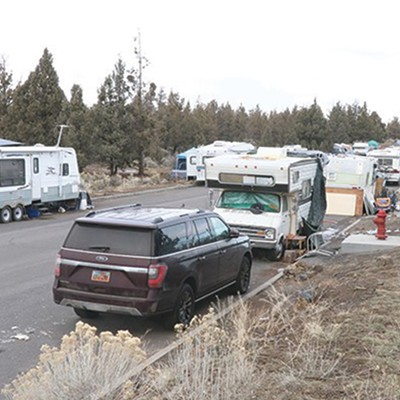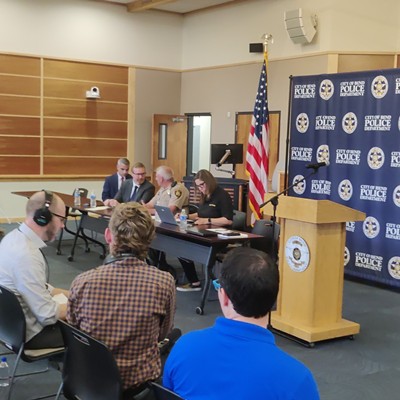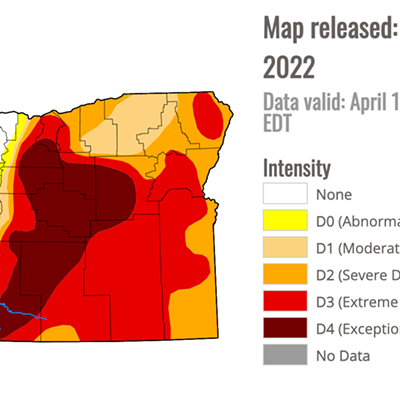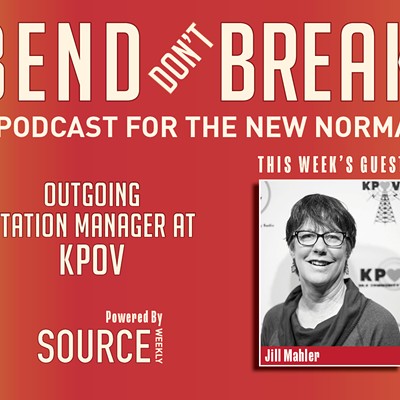A resolution presented before the Bend City Council is looking to effect environmental change locally, but has been causing controversy due to the way it was introduced. The resolution for climate action was originally introduced as an ordinance before the city council—something that did not sit well with local business advocates.
The most recent language of the ordinance stated that, "By 2030 all businesses, local governmental entities and individuals living or working in the city shall collectively reduce the city's per capita fossil fuel use by 40 percent and by 2050 by 70 percent. Fossil fuel usage from 2010, or more recent years, shall be used to establish a baseline for both of these targets." However, there has been no baseline study, in 2010 or more recently, and local business advocates expressed concern about establishing set goals without understanding what Bend's greenhouse gas baseline is or having a conversation about how best to reach those goals.
At the June 15 Bend City Council meeting the ordinance was reintroduced as a resolution, which removes any set goals for the community (but does keep the goals for the city government). The move allows for a steering committee to conduct the studies needed, as well as to come up with a plan on how to best achieve goals, before it becomes a full-fledged ordinance.
Need for a climate change The ordinance began its journey a year ago when a group of citizens, calling itself the Climate Ordinance Working Group, came together to begin talking about the issue. Numerous communities in Oregon are working on, or have passed, their own initiatives, and the group wanted to look at what was needed in Bend.
"We basically came up with a draft and we did talk to a couple (city) councilors and some city staff to get their feedback as well," said Nikki Roemmer, one of the members of the citizen group. "We definitely wanted it to be attainable, we wanted it to be something that the city council and city staff could jump on board with. And also something that was meaningful."
The group spoke with City Councilor Doug Knight, who encouraged them to come up with their own language, rather than relying on city staff.
The Climate Ordinance Working Group spent a year meeting to formulate the text of the ordinance. According to Roemmer, they looked at studies in 25 other cities that have current, pending, or implemented climate action plans, and found the top priorities were similar, including: buildings and energy, food and agriculture, land use and transportation, urban forests and natural resource systems, and consumption and waste.
Because the ordinance has been introduced as a resolution, the text has changed to allow time to study the current environment in Bend and propose plans for implementation. To do this, a climate action steering committee would be created to oversee the development of the plan, and local businesses would potentially be an important part of that.
According to group member Bob Lorenzen, who also ran sustainability programs at the Eugene Water & Electric Board for 30 years, the committee will do an assessment to identify the major generators of greenhouse gases in the community. He explained, "It's fair to say that looking outside of city government to the community, probably the major focus is going to start taking a look at building efficiencies, both in the residential and commercial or business sectors. And there are plenty of opportunities that exist."
The goals of the commission will be to come up with scenarios, generate ideas for implementation, cost items out, and determine where the burden will fall.
The Climate Ordinance Working Group felt it was important to study what other cities have done, but stressed that the local plan will be very specific to Bend.
"We did create this so that the public would come together to decide what Bend's plan would be," Roemmer said. "We're not Eugene, we're not Portland. We're Bend. And so (our focus is) what's going to work for Bend." Pushback The ordinance faced an uphill battle from the very beginning, for multiple reasons. An ordinance is a law, meaning the goal stated would have to be achieved, even though the group did not have a baseline greenhouse gas study or even an initial path to achieve those goals. Even though the ordinance would create a steering committee to study what needed to be done, that committee would have to work within the pre-set goals. Members of the business community showed the most concern about the proposed text.
The second issue was enforceability. The climate ordinance working group acknowledged there is currently no way to know whose responsibility it will end up being, and group member Helen Seidler explained that this will not be a one-on-one measurement: "It's not like every household or individual is going to be measured." She said some will end up doing more, and some will end up doing less.
For Roger Lee, executive director of Economic Development of Central Oregon (EDCO), that presents a big problem for businesses. "It's very difficult to regulate and to enforce individuals. (Are we going to ask) 'Did you drive your car five times this week?' How is somebody going to monitor that? So businesses wind up footing the bill for this a lot of the times," he explained. "They are kind of the lowest hanging fruit for regulatory bodies to go after."
EDCO has not yet taken an official stance on the ordinance, but Lee said if the ordinance had originally been presented as a resolution, they would have taken less issue with it. He felt it was the wrong way to present a new idea to the community, especially the business community.
Knight said another issue with implementation is the lack of a baseline measurement, because, "It is very difficult to enforce something that you can't measure, or that there is difficulty measuring." Because much of Bend's power is purchased from a larger grid that gets its energy from multiple sources, pinpointing exact energy production vs. usage is not always an easy task.
The change from an ordinance to a resolution will also help the steering committee establish a timeline for setting the goals and then implementing them, something that the committee expects will help enforce the eventual ordinance in the long run.
The change from an ordinance to a resolution means that there will be community feedback before any community goals are set. According to Gillian Ockner, senior policy analyst with the City of Bend, this will help create more discussion about who can help and in what ways — as well as who will pay for implementation. Other cities that have passed similar resolutions are working with their business communities, rather than forcing them into change.
"None of them are going out to the business community and saying, 'You have to do this by so and so a time or else,'" she explained. "All of them are looking for ways to capture low-hanging fruit, incentivize actions that are a little harder, and doing that with partnerships."
Reintroduction The Climate Ordinance Working Group wanted to introduce the plan as an ordinance because they worried about a resolution falling by the wayside.
"We drafted the policy as an ordinance because it ensures that Bend will start taking action now, that the climate action plans will be created by the broad community, and a plan will be adopted by city council within a specific timeframe," Roemmer explained. "We also thought an ordinance was the appropriate policy framework because an ordinance intent is to establish a long-term rule, policy or procedure, and climate change is a very long-term issue."
With the new resolution, those goals for the community (businesses and individuals) would be laid out after the studies are completed. Group members said they are "disappointed" in the move to a resolution and are "concerned that the community goal by 2030 to collectively reduce the city's per capita fossil fuel use by 40 percent and by 70 percent by 2050 has been removed or lacks clarity. The timelines for the climate action plans are also vague, since they are stated as approximate, which raises some concerns."
But for Knight, the move to a resolution was also a message to his fellow councilors that the Climate Working Group is willing to compromise, in hopes they will receive a unanimous vote—which would in turn send a strong message to the community about how serious the city is about climate change.
"The change from ordinance to resolution in my mind is an incremental step necessary now to get us to the end product of an ordinance in order to have the maximum buy-in, the broadest community support possible, and thus the greatest advocacy. It's necessary now to make it a resolution," he said.
Cost The problem remains that no one knows what implementation or costs will look like, but Knight and the Climate Ordinance Working Group are hoping businesses and individuals are willing to take a chance, especially since they have shown their willingness to compromise. More than 75 businesses have signed on to support the resolution so far, and Ockner explained those businesses taking the chance on the unknown could be important to helping other businesses understand how it will affect them in the future.
"We have a lot of businesses out there that are early adopters of highly efficient energy operations," she explained. "So the first step would be to engage the business community in discussion of, 'Let's look for examples in our existing community of what can be done' and really analyze the cost savings so that they can then look for ways to market that to other businesses."
Knight also stressed the importance of buy-in from stakeholders, "...including the businesses in the community who will realize that through efficiencies we also can have environmental change. So we are going to describe environmental change as a goal, but as a by-product of that we are going to have efficiencies in our business, which is good for business and profitable as well."
The city recognizes its budget will be tied to the city's implementation, but businesses and individuals will also be on the hook for their share. The Climate Ordinance Working Group has not yet looked into whether there will be any sorts of incentives offered, including grants, for businesses or individuals to implement the ordinance, but Seidler believes that it will be an "...incentive in and of itself to move in that direction."
"I don't think it's realistic for individuals and businesses to expect that there is going to be no change involved, no working out new strategies, and perhaps bearing some costs," Seidler said. "But in the long term we can't afford not to do it."
The City of Bend is ready to work on implementing a climate change plan, and if the resolution passes, Ockner believes it will bring important change to Bend's infrastructure. "I think that is going to be challenging and we're all going to have to grow and stretch, and there are going to be uncomfortable parts of it I'm sure. But having businesses at the table to talk about that is going to be critical," she said. "From my perspective this is a huge opportunity for the community to look at ways we can make good decisions for responsible use of public dollars."

























